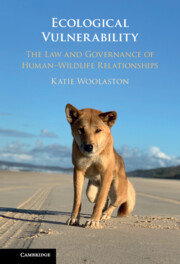Book contents
- Ecological Vulnerability
- Ecological Vulnerability
- Copyright page
- Contents
- Abbreviations
- 1 Introduction
- 2 The Human–Wildlife Relationship
- 3 Friends in the Wild?
- 4 Friends in Law?
- 5 Human–Dingo Conflict on K’gari (Fraser) Island
- 6 Human–Elephant Conflict in Northern Botswana
- 7 Pandemic Vulnerability and Resilience
- 8 Conclusion
- Index
8 - Conclusion
Published online by Cambridge University Press: 09 June 2022
- Ecological Vulnerability
- Ecological Vulnerability
- Copyright page
- Contents
- Abbreviations
- 1 Introduction
- 2 The Human–Wildlife Relationship
- 3 Friends in the Wild?
- 4 Friends in Law?
- 5 Human–Dingo Conflict on K’gari (Fraser) Island
- 6 Human–Elephant Conflict in Northern Botswana
- 7 Pandemic Vulnerability and Resilience
- 8 Conclusion
- Index
Summary
The conclusions reached in Chapter 8 centre on the formulation of liberal autonomy in our wildlife laws and policies. Throughout the book it was demonstrated that autonomy has been created and maintained by a dominant neo-liberal and capitalist paradigm because it serves and furthers that paradigm. This relationship between autonomy and neo-liberalism creates a hierarchy that serves western notions of power and control. The law is a tool that has been used to this end. Further, these themes dictate our relationship with wildlife because the law as an institution creates and maintains these themes in wildlife governance. Instead, the research suggests that we need a broader and more inclusive view of the relationship, which extends outside of the dominant paradigm. The conclusions foreground a possible move away from the promotion of autonomy as the basis of our laws and policies and a move towards a response to vulnerability that builds resilience. This can be achieved with further focus on inclusive collaborative governance, traditional ecological knowledge, compassion, emotion and other forms of knowledge and an acknowledgement of the intrinsic value of wildlife and the environment as a whole.
Keywords
- Type
- Chapter
- Information
- Ecological VulnerabilityThe Law and Governance of Human–Wildlife Relationships, pp. 216 - 228Publisher: Cambridge University PressPrint publication year: 2022

